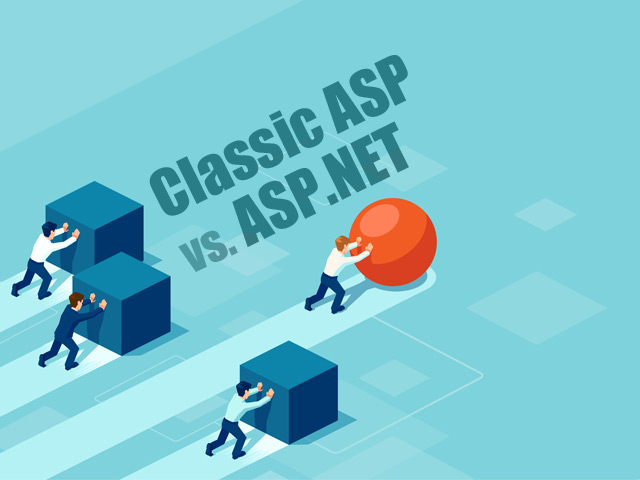
A Classic ASP to ASP.NET Migration is essential to build robust and well-architected software for your business. Typically, legacy ASP applications were built using VBScript interfaces with backend Access databases. Microsoft has redirected development efforts away from VB/ASP/Access to ASP.NET and SQL.
ASP is a server-side scripting engine known for its dynamic generation of web pages. The script mainly written in VBScript, JScript, or PerlScript, is interpreted server-side and then sent to the client-side browser for rendering. ASP.NET on the other hand is a powerful programming framework consisting of many object-oriented languages, class libraries, and Common Language Runtime. The application developed in ASP.NET can have configurable components, integration to multiple data sources, and user interfaces.
Macrosoft’s Migrate to .NET team has developed a proven migration methodology. Our team works to understand your business and technical requirements and provide you specific options for your application’s transformation. Our specialized migration QA team thoroughly tests each new application.
Four main areas make ASP.NET a much better choice as an enterprise application development framework.
ASP is vulnerable to application crashes due to its processes, as IIS needs to be paused or restarted regularly. ASP.NET process is separate from its process spaces, which avoid application crashes and ensures a stable application.
Classic ASP is comprised of VBScript or JavaScript and each page is executed at run-time. This line-by-line overhead drives down the performance.
On the other hand, ASP.NET compiles the code the first time it is accessed and the compiled codes housed within assemblies as .NET classes. This allows subsequent page requests to be serviced with previously compiled code. Therefore, ASP.NET inherently delivers a far more secure and efficient rendering model and improved user experience.
With Classic ASP applications, page components are difficult to update, maintain, or replace. Updating a component requires shutting down the process space, replacing the component, and restarting the IIS. This means application downtime.
ASP.NET comes with built-in capabilities to perform scalable and efficient updates without application downtime. .NET deployment model enables the replacement of pages and components by directly changing the code without restarting the webserver. The infrastructure accounts for the change when a new request is made to that altered page or component. Therefore content updates, fixes, and enhancements in an ASP.NET application can be made with little to no impact on the user base.
Unfortunately, Classic ASP only supports VBScript and JavaScript. ASP.NET supports server-side programming and scripting languages. C# and VB.NET become instantly accessible to developers within ASP.NET. Furthermore, the .NET class libraries are invoked within the same application. This gives ASP.NET developers complete control and flexibility over building limitless functionality and user experience.
ASP.NET makes the development of robust, rich applications possible with deep programmatic support.
If you are looking to use Microsoft technologies to develop new desktop based applications, you have ...
The time really has come to virtualize your VFP application. We are not talking about migration or conversion or bringing ...
The rapidly evolving digital market demands that businesses keep their technology stacks current to stay competitive, efficient, and scalable. One ...
Technology evolves rapidly, and organizations still relying on legacy systems built with Classic ASP and VB6 are facing increased challenges. ...